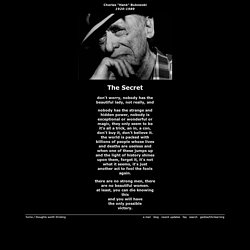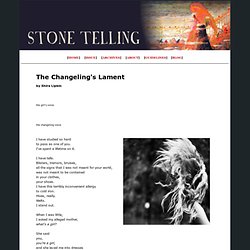

LIFE AS A HUMAN - Do Not Stand At My Grave And Weep. There will come a time. The Secret. Don't worry, nobody has the beautiful lady, not really, and nobody has the strange and hidden power, nobody is exceptional or wonderful or magic, they only seem to be it's all a trick, an in, a con, don't buy it, don't believe it. the world is packed with billions of people whose lives and deaths are useless and when one of these jumps up and the light of history shines upon them, forget it, it's not what it seems, it's just another act to fool the fools again. there are no strong men, there are no beautiful women. at least, you can die knowing this and you will have the only possible victory.

Pablo Neruda Quotes (Author of Twenty Love Poems and a Song of Despair) Poetry - Frederick Perls - Gestalt Prayer. Stone Telling: The Magazine of Boundary-crossing Poetry. By Shira Lipkin the girl's voice the changeling voice I have studied so hard to pass as one of you.

I've spent a lifetime on it. I have tells. When I was little, I asked my alleged mother,what's a girl? She saidyou,you're a girl, and she laced me into dresses (that I tore off in the school parking lot, in line for the bus). My dancing was different. And everything is about containment is about being delicate and pretty laced into corsets whalebone stays digging into your ribs because it's not beauty if it doesn't hurt. But I studied. None of it is in my nature. I am something larger, more fluid, less constrained. Shira Lipkin is a writer, activist, mother, and nexus. Read Shira's discussion of this poem over at the Roundtable!
If you enjoyed this poem, please consider donating a few dollars to help Stone Telling continue, and showcase many more fantastic and diverse voices! Photography:Untitled, by Graham Blackall. Woodberry Poetry Room. Do not stand at my grave and weep. Do Not Stand at My Grave and Weep is a poem written in 1932 by Mary Elizabeth Frye.

Although the origin of the poem was disputed until later in her life, Mary Frye's authorship was confirmed in 1998 after research by Abigail Van Buren, a newspaper columnist.[1] Full text[edit] Do not stand at my grave and weep, I am not there; I do not sleep. I am a thousand winds that blow, I am the diamond glints on the snow, I am the sunlight on ripened grain, I am the gentle autumn rain. When you awaken in the morning’s hush I am the swift uplifting rush Of quiet birds in circled flight. I am the soft stars that shine at night. Do not stand at my grave and cry, I am not there; I did not die. Origins[edit] Mary Frye, who was living in Baltimore at the time, wrote the poem in 1932.
Mary Frye circulated the poem privately, never publishing or copyrighting it. The poem was introduced to many in Britain when it was read by the father of a soldier killed by a bomb in Northern Ireland. BBC poll[edit]